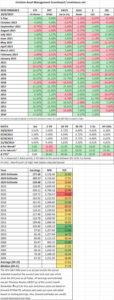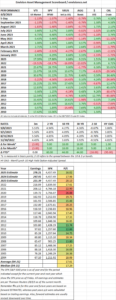Author Archives: Bruce Konners
Week Ending 9/29/2023
September 2023 Recap
September 2023: A Grim Harvest for Financial Markets
September proved to be a harsh month for financial markets, echoing the falling autumn leaves with a sharp decline across major asset classes. Here’s a closer look at the key themes:
Stocks Plummet:
- The bears feasted in September, sending major indices reeling.
- The S&P 500 tumbled 4.8%, the Dow Jones shed 3.4%, and the Nasdaq Composite plunged 5.8%.
- Technology stocks, once the market darling, led the downward charge, facing the brunt of higher interest rate concerns.
- All other sectors, except energy, ended the month in the red.
Hawkish Fed Hammers Sentiment:
- The Federal Reserve delivered another 0.25% rate hike, but its hawkish rhetoric cast a long shadow.
- Officials hinted at continued tightening, even at the risk of economic slowdown, to combat persistent inflation.
- This triggered fears of an “earnings recession” and further dampened investor sentiment.
Weaker Economic Data:
- Economic data pointed towards a potential slowdown.
- Retail sales and industrial production grew at a slower pace, while consumer confidence remained subdued.
- These numbers fueled concerns about the impact of higher rates on economic activity and corporate profits.
Bond Yields Climb:
- The 10-year Treasury yield soared from 4.15% to 4.58%, reflecting the market’s anticipation of more rate hikes.
- This further pressured growth stocks and caused a flight to safety towards bonds.
Global Malaise:
- International markets mirrored the US weakness.
- The MSCI EAFE fell 3.4%, with European economies grappling with energy shortages and inflationary pressures.
- Emerging markets suffered even more, with the MSCI EM dropping 2.6% amidst slowing growth in China and global risk aversion.
Other Notable Events:
- The UK entered a recession, raising concerns about a similar path for other economies.
- Geopolitical tensions remained elevated, with the war in Ukraine and US-China relations presenting uncertainties.
- Supply chain disruptions continued to impact businesses and add to inflationary pressures.
Overall, September 2023 was a harsh reality check for financial markets. The optimism of earlier months dissipated under the weight of rising interest rates, slowing economic growth, and heightened geopolitical anxieties. October will be crucial in determining whether this downturn is a temporary blip or a sign of a longer-term bear market.
Week Ending 9/22/2023
RECENT MARKET NEWS
- US markets down by 2.98% for the week and are now down 4.24% for the month, international stocks fall by 1.99%. Bonds were down by 0.46% and down by 1.54% for the month. The 10-year bond hit a 16-year high.
- The CPI was up by 0.6% month over month and 3.7% year over year, mainly due to higher energy prices.
- There is still hope for a soft landing, but inflation, fed policy, and higher interest rates all present challenges.
- The US budget deficit was $1.5 trillion as of the end of August, up by $577 billion from last year. And, of course, higher interest rates will make the situation that much more unmanageable.
SCOREBOARD
Week Ending 9/15/2023
Week Ending 9/8/2023
Week Ending 09/01/2023
August 2023 Recap
August 2023: A Month of Two Halves for Financial Markets
The summer heat wasn’t the only thing that cooled down in August. After a promising July, financial markets faced a reality check and retreated across most asset classes. Here’s a breakdown of the key themes:
Equity Market Tumble:
- Major indices retreated, ending the month on a sour note.
- The S&P 500 lost 1.5%, the Dow Jones slipped 2.0%, and the NASDAQ dipped 2.1%.
- The first half rally fizzled out, with all major sectors ending the month in negative territory.
Rising Interest Rates:
- Hawkish rhetoric from Fed officials and stronger-than-expected economic data revived concerns about higher interest rates.
- The 10-year Treasury yield climbed from 3.75% to 4.15%, reflecting investor expectations of further tightening.
- This put pressure on equities, particularly growth stocks sensitive to higher borrowing costs.
Mixed Global Performance:
- International markets experienced a more pronounced downturn.
- The MSCI EAFE fell 3.8%, dragged down by European worries and a stronger dollar.
- Emerging markets suffered even more, with the MSCI EM tumbling 6.2% amidst concerns about China’s slowing economy and geopolitical tensions.
Economic Data Rollercoaster:
- Positive job numbers and retail sales were overshadowed by weaker consumer confidence, mortgage applications, and manufacturing activity.
- This mixed bag left investors uncertain about the true state of the economy and its future trajectory.
Other Notable Events:
- China’s property sector turmoil triggered fears of contagion in global markets.
- Tensions between the US and China regarding Taiwan continued to cast a shadow on sentiment.
- The war in Ukraine remained a source of concern and uncertainty.
Overall, August 2023 painted a picture of financial markets adjusting to a changing environment. The initial optimism fueled by easing inflation and strong earnings gave way to anxieties about rising interest rates, slowing economic growth, and geopolitical risks. The next few months will be crucial in determining whether this pullback is a temporary correction or a sign of a more extended downward trend.
Week Ending 08/25/2023
MARKET RECAP
- US stocks were up by 0.73%, international +0.72%, bonds +0.26% but for August, US equities are down by 4.27%.
- The 2-year yield is now at 4.98%. The 10-year is at its highest level since 2007 at 4.34%.
- Earnings estimates have been trending up for the last three weeks.
- The GDPNow estimate is ripping up at +5.9%, but two retailers, Macy’s and Dick’s, indicated some problems, higher theft, and credit card delinquencies. Dick’s missed estimates.
- Powell spoke on Jackson Hole and left open the possibility of a September increase.
SCOREBOARD
Week Ending 8/18/2023
MARKET RECAP
- US stocks -2.16%, international -3.03%, bonds -0.47%.
- Interest rates are up by 21 basis points on the 10-year to 4.30%. Rates were as high as 4.33%, the highest rate since 2007.
- GDPNow is tracking at 5.8%, a stronger economy is pushing up rates.
- If rates are going to be higher for longer, then the math suggests lower p/e multiples for stocks.
- Mortgage rates hit a 20-year high, 7.09%.
SCOREBOARD








